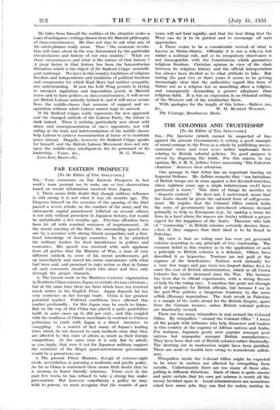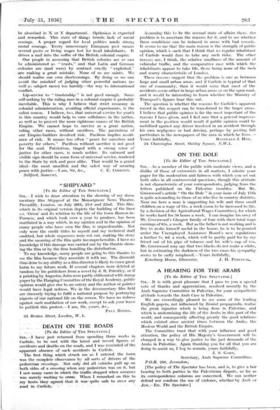THE COLONIES AND TRUSTEESHIP.
[To the Editor of THE SPECTATOR.]
SIR, —The Spectator (which cannot be suspected of bias against the present Government) is setting a good example of moral courage to the Press as a whole by publishing uncon- ventional views and even some rather unpleasant facts relating to British colonial policies. No good purpose is served by disguising the truth. For this reason; in my opinion, Mr. J. M. N. Jeffries' letter concerning "The Palestine situation " deserves close attention.
One passage in that letter has an important bearing on
Imperial Defence. Mr. Jeffries remarks that "ten battalions of British troops are in arms against a few devoted wretches, where eighteen years ago a single infantryman coul I have garrisoned a town." This state of things he ascribes to " despotic control." He does not, I understand, mean that the Arabs should be given the outward form of self-govern- ment. He implies that the Colonial Office (which holds the reins of government) has introduced schemes devised primarily to help us Europeans (e.g., by making a home for Jews in a land where the masses are Arabs) without a proper regard for the happiness of the Arabs. Theorists -who talk of " trusteeship " in British colonies certainly deceive them- selves if they suppose that their ideal is to be found in Palestine.
My view is that no ruling race has ever yet ..governed colonies according to any principle of true trusteeship. The common belief in this country as to the application of such a principle to British colonies is a delusion. Others have described it as hypocrisy. Trustees are not paid at the expense of the beneficiaries. Natives work (actually for a very low wage) and pay taxes too (import duties, &c.), to meet the cost of British administration, which in all Crown Colonies has vastly increased since the War. The increase has been due to official experiments, with a strong flavour of help for the ruling race. I mention this point not through lack of sympathy for British officials, but because I see in the post-War policies a dangerous tendency to -tlie more selfish (Roman) imperialism. The Arab revolt in Palestine is a sample of the rocks ahead for the British Empire, apart from the German menace, unless British colonial policies are drastically revised.
There are too many wirepullers in and around the Colonial Office. By wirepullers " around the Colonial Office " I mean all the people with influence who help financiers and traders in this country at the expense of African natives and Arabs. For instance, Japanese goods were popular amongst poor natives but unpopular amongst British manufacturers. They have been shut out of British colonies rather drastically. The shutting out in moderation might have been justified. There are seeds of trouble here- owing to -immoderate selfish- ness.
, Wirepullers inside the Colonial. Office might be -expected to be wiser in matters not affected by. wirepulling from outside. Unfortunately there are too .many of these also, pulling -in different directions. Each of them is .quite -sincere and quite certain that ,his own pet scheme. is worth all the
money lavished upon Local administrators are sometimes asked how many jobs they can find for cadets waiting to be absorbed in. X .or Y department– • Optimism is expected and rewarded. This state of things breeds, lack of moral courage. A proper regard for local politics needs strong moral courage. Every unnecessary European post means several posts or living wages lost for local inhabitants. It drives a. nail into the coffin of the British. colonial empire.
Our people in assuming that British colonies are or can be administered as " trusts," and that Latin and German ,eolonies are (and were) by contrast cruelly " exploited," are making a great mistake. None of us are saints. We should realise our own shortcomings. By doing so we can avoid the mischief of judging other powerful nations (as well as subject races) too harshly—the way to international conflict.
Lip-service to " trusteeship " is not good enough. Sonic self-seeking by the ruling race in a colonial empire is probably inevitable. This is why I believe that strict economy in colonial administration, avoiding official experiments, is the safest course. I believe, too, that universal service for youth in this country would help to cure selfishness in the nation, as• well as to protect the more righteous causes of the British EmPire. We cannot hope to survive as a great nation, ruling other races, without sacrifices. The patriotism of our. Empire-builders involved risk. Pacifism implies avoid- ance of risk. It means too often " peace for ourselves and poverty for others." Pacifism without sacrifice is not good for the soul. Patriotism, tinged with a strong sense of justice for other races, is much nobler. Its outward and . visible sign should be sonic form of universal service, rendered to, the State by rich and poor alike. That would be a grand ideal—the most unselfish and the safest way of securing







































 Previous page
Previous page